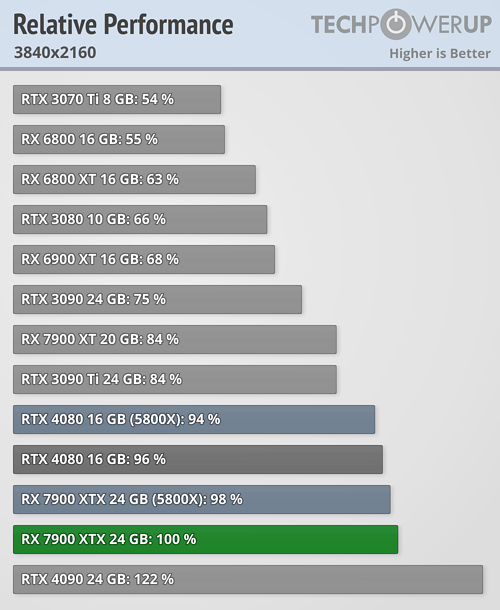Hello. I trying to make sure I know something before giving people advice about building a PC.
If you are building a PC for just gaming, the AMD Ryzen 5 7600 and faster processors, currently beat Intel Core I5-14600 processors.
No, that's not true. The i5-14600K is faster than the R5-7600:
Now, when it comes to power efficiency, it's not even close, the R5-7600 is vastly more efficient. In TPU's application suite, the i5-14600K draws 93W:
While the R5-7600 only draws 54W:
You can see that it's the same suite because the R9-5950X draws 87W in both charts.
And if one buys an AMD configuration the graphics should be AMD as well. But why?
That's completely false. Radeon and GeForce cards are both 100% compatible with both AMD and Intel CPUs. There is no advantage offered to a Radeon card by a Ryzen CPU and vice-versa. Some people have Intel with Radeon, some have Intel with GeForce, some have AMD with Radeon and some have AMD with GeForce. They all work just fine with each other.
Am I right about the processors? I did see benchmarks of the AMD 7800X3D beating the Intel Core I7-14700k in frame rates alone.
The R7-5800X3D does beat everything else in gaming, including the 19-14900K:
And I don't know why but shouldn't one get an AMD Radeon RX 7000 series graphics if buying an B550/X570 chipset and AMD 7800X3D processor?
No, you should get whatever suits your needs the most without paying any attention to the brand (unless it's an Intel ARC, I would still avoid those at this time). You won't get a performance boost by having an all-AMD gaming PC. The performance will depend on the balance between the CPU and video card regardless of their branding.
Now, having said all of that, I do believe that an all-AMD build is the best way to go but not because of performance.
In the case of CPUs like the R5-7600 and R7-7700, they're actually $20 cheaper than they appear compared to their Intel counterparts because they come with coolers and they're so power-efficient that the air coolers they come with are all that you need. With an Intel CPU, you'd have to buy a cooler for it which would be at least $20. Then there's also the fact that the AM5 platform will be very long-lived and CPU upgrades in the future would just be drop-ins without needing a new motherboard or RAM. There's significant value in that. At the high-end, sure you'll need to buy a cooler regardless (unless you already have an AM2/AM3/AM4 cooler) but the power efficiency gap between AMD and Intel is about as wide as a canyon:
Nothing makes me laugh harder than someone claiming that they have a GeForce video card because it's more power-efficient than a Radeon while rocking a 13th/14th-gen i7 or i9 CPU.
😊
As for taking an Radeon video card, I recommend those simply because they're faster than GeForce cards at similar (and sometimes higher) price-points. Sure, the GeForce cards are faster when using RT but that's not something that is applicable to everyone while gaming performance IS applicable to everyone. I'll use my own RX 7900 XTX as an example:
I'll explain my logic for why the RX 7900 XTX is the best buy of the top three (RTX 4090, RX 7900 XTX and RTX 4080):
The RTX 4090 is 22% faster than the RX 7900 XTX with the same amount of VRAM (24GB). However, the RX 7900 XTX only costs $960 while the RTX 4090 costs (at least) $1844. That's a price increase of 92% and it's only for as long as the PNY version of the card is available at B&H Photo for that price because the next step up is $2095 which is more than double the price of the RX 7900 XTX. I can't think of a reality in which that would be a good choice for a gamer.
The RTX 4080 is 4% slower than the RX 7900 XTX (which essentially means they're tied)
The RTX 4080 has 16GB of VRAM and while that's nothing to sneeze at, it's less than even the much less expensive RX 7900 XT (20GB) and just looks silly compared to the 24GB of the XTX. Meanwhile, the 4080 costs at least $1160 which makes it 20% ($200) more expensive than the XTX. Why would a gamer choose a card that costs an extra $200 than the XTX despite the XTX being 4% faster and having 50% more VRAM?
Those are the reasons to go all-AMD. Mythical compatibility and performance improvements are not.







